"Say literary festival directors and publishers, who despite being conflicted about making the transition online, feel quality conversations about books and writers must continue in a post-pandemic world"
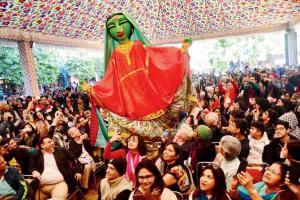
Audience seen during the inaugural day of Zee Jaipur Literature Festival, at Hotel Diggi Palace in Jaipur this year. Pic/ Getty images
A week from now, on August 9, the Bengaluru Poetry Festival will open its doors to lovers of verse, albeit in a "new metre and with a different composition". Shinie Antony, festival director, in a first, has dared to take the event online. This was not part of the plan, at least not until a few months ago.
ADVERTISEMENT
Like every year, work for the festival, which is backed by Atta Galatta founders Lakshmi and Subodh Sankar, began in January with the collation of a wish-list. Usually, towards August "the pace intensifies and stress levels pleasantly rise, as names on the list are constantly reviewed, on unavailability largely, but also because delicious new names are suddenly thrown at us, and we want to fill the festival with shocking content," says Antony, in an email interview. The challenge this time, however, was of another kind. The pandemic and the subsequent lockdown rules, which stressed that social distancing was to be the order of the day, meant that the festival either be shelved, or have a new life, online.
Despite the initial reluctance, which was primarily due to the online fatigue people were already experiencing, Antony decided to give it a shot. "To go ahead with a festival that is solely online needs more imagination from a poet perhaps than any other writer. But for us it was about the spirit of it all, with poets and poetry lovers both needing a gentle cloudburst around this time, something to keep us going during these clockless days and nights… We thought if we can't come up with an easy [online] format—pre-recorded, to the point—let's not do this. Surprisingly, it was the poets themselves who helped set the mood for this year's festival," she shares.
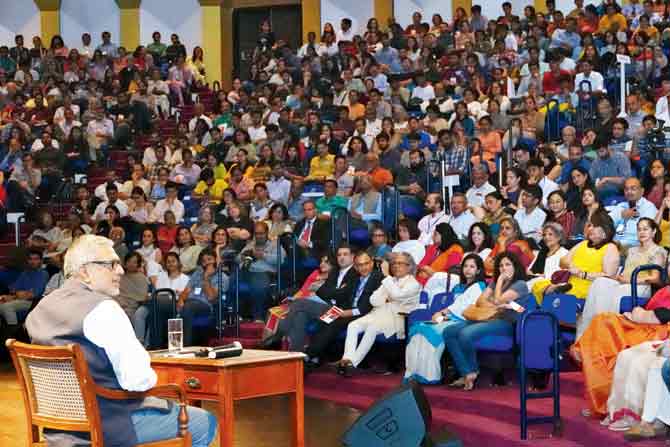
The Tata Literature Live!, which turned 10 last year, will be holding the festival from November 19-22.
Closer home, the Tata Literature Live! that turned 10 last year, and continues to draw crowds in droves during its annual run in Mumbai every November, is already gearing up for this year's festival. Anil Dharker, founder and director, who at the beginning of the lockdown was quite despairing about the fate of the festival, has a renewed sense of confidence, when we speak with him.
The festival, he says, will be held from November 19 to 22, this year. "The question is whether it is going to be offline or online, which I don't think anyone can predict. It is increasingly looking online, because even if we do get clearances, how many people will actually venture out into the auditorium. It's all iffy at the moment," says Dharker. "But we are preparing for both eventualities."
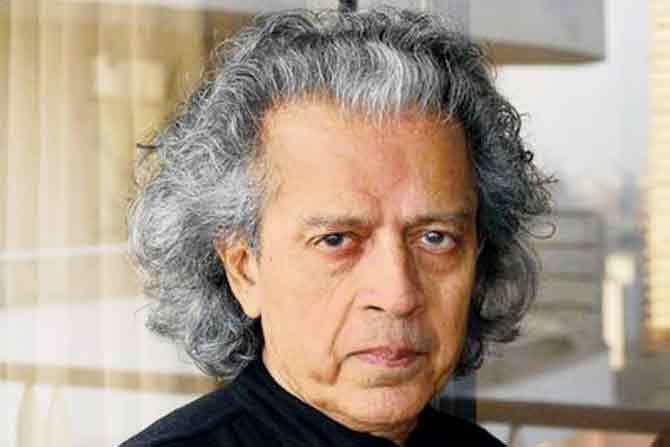
“The question is whether it is going to be offline or online, which I don’t think anyone can predict,” says festival director and founder Anil Dharker
Both the Tata Literature Live! and the Jaipur Literature Festival (JLF) had very early on into the lockdown, made their online presence felt with live sessions and interviews. While Dharker experimented with a combination of sessions, which included freewheeling chats with novelists and writers, as well as panel discussions with corporate honchos and business experts, aptly named Business Sutras (and Shastras), JLF launched an entirely new digital edition for their brand. "All of us—me, Sanjoy K Roy [festival producer], William Dalrymple [co-director]—sensed the urgency of the events surrounding us and felt we needed to make sense of them via the virtual platforms that were available. We ideated and discussed the options, and decided on calling it JLF Brave New World. The title struck a deep chord, and the themes addressed a real need," says JLF festival director Namita Gokhale. On July 29, JLF Brave New World hit a century of sessions, with writer Amitava Kumar leading a session with Booker Prize-winning author of Lincoln in the Bardo, George Saunders.
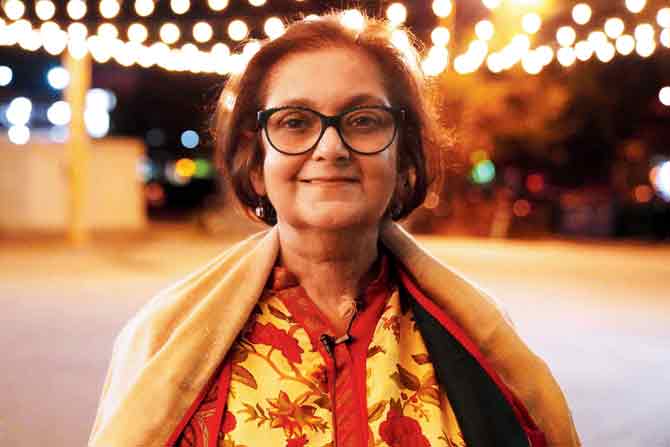
Namita Gokhale, JLF festival director
While JLF is yet to take a call on its January event, held otherwise at the Diggi Palace in Jaipur, its annual London JLF British Library edition, is being staged virtually from September 11 to 13. "We are, like everybody else, waiting and watching and observing how the world unfolds, and debating the available options. But the hybrid models of virtual and physical approaches do seem the way forward," adds Gokhale.
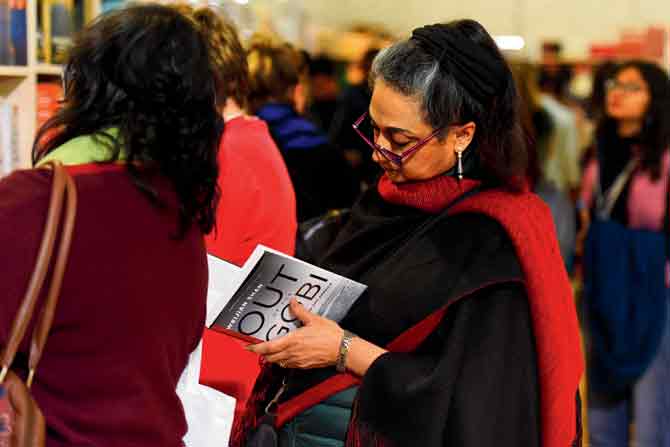
A visitor reads a book during the third day of JLF this year. PIC/GETTY IMAGES
What makes someone like Dharker, who until the lockdown was shy if not resistant to the idea of an online event, is that the positives of it balance the negatives. "For our online sessions, we have been getting an excess of 5,000 to 6,000 people. That is six Tata [at NCPA, the festival venue] auditoriums put together. And it's a lot, considering we get a thousand people for very few events," he says. "What I do see happening is that the physical presence of foreign participants will be vastly reduced. But, we can always have them online. So, we may, in fact, have more people than usual." Not to mention, access will become far easier. It will take far lesser effort than going to the NCPA, and queuing up for a pass, adds Dharker. "It alters the scenario. It doesn't necessarily detract from it. The interaction becomes different, a little more impersonal of course, but, it is not a hopeless situation."
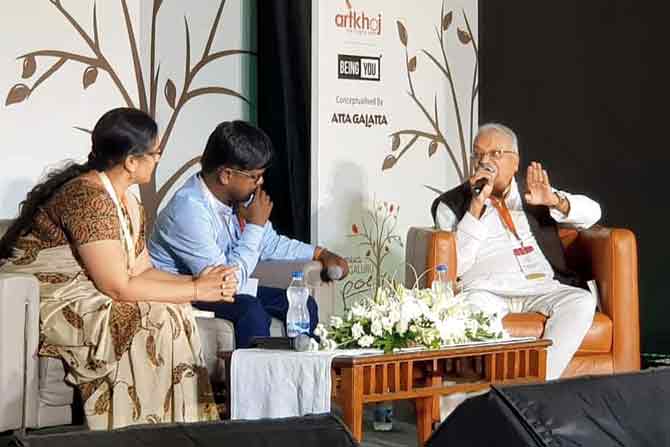
The Bengaluru Poetry Festival will make its online debut on August 9, says Shinie Antony, festival director
In a piece for a daily newspaper in May, Vivek Menezes, who is the co-founder and co-curator of the Goa Arts and Literature Festival (GALF) alongside veteran writer Damodar Mauzo, had shared that GALF 2020, which was scheduled for December, would most likely be scrapped. While chances of an offline event happening are thin, Menezes is still thinking about how the team can perhaps, "reinvent the lit festival practice in a way that gives back more concrete value to the reader and the author".

"Our festival is quite different [from the rest]—it's run by writers and on a shoe-string; the business element has never entered our festival. The point was always to do something different in Goa. When we started out, which was just about 10 years ago, JLF was becoming famous, but there weren't too many other literary festivals in the country. What we discovered very early on was that writers like Mauzo, who is a brilliant Konkani writer of tremendous international stature, were being ignored by the emerging festivals. They didn't figure on anyone's radar. We started with the conviction that the market, [and] the dominant paradigms are leaving us out of it. One of the pernicious things about India is that a small coterie of people, dictate what is tasteful, or what is meant to be a success. And very often it's wrong. If I am constructing a world view for India, I'd much rather construct it around poles, like we have done which is invite writers from Goa, Northeast, Kashmir, Bangladesh, Nepal, Pakistan, the diaspora, and Dalit writers. It is our own idea of excellence," says Menezes.
GALF began with few resources. "But from the moment we came together it was like magic. We immediately realised this was a winning formula, and it was predicated on bringing people together in Goa, which in itself is this non-confrontational, laid-back, informal and intimate venue. Building on this strength, we've built a formidable meeting ground with lots of real-life implications," he adds.
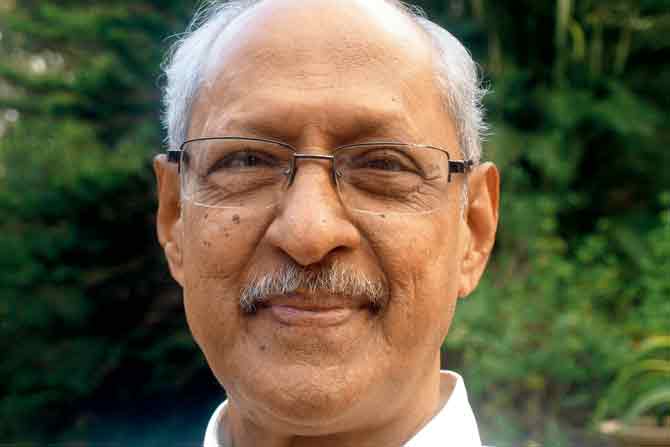
Damodar Mauzo, Veteran Writer
When the Coronavirus outbreak happened, both Damodar and Menezes were of the view that for the festival to stay true to itself, they needed to physically bring it together in front of their audience. "But over the course of the last few months, it has become clear that books and writing, at least the ones that we pay attention to, are important, and the writers even more important than before. In fact, their global relevance is becoming more emergent. We are starting to think about models in which the literary festivals can move about. I have watched a few sessions online, and it's really not the same thing. We will need to reinvent," he adds.
While publishers and writers are warming to this transition to the online, mostly due to the lack of available options for quality conversations on books, they hope that this isn't going to be long-term. "For publishers, literary festivals are a welcome break from heartless P/L sheets and an opportunity to meet and interact with other publishing professionals and authors—to spot new talent, to listen to speakers who spark new thoughts, and to drink wine if offered, too, of course. It gives the authors [and publishing houses] who are invited a well-deserved moment in the sun, an opportunity to showcase their books and minds to an often receptive audience, publicity through local newspapers, which talk about the ongoing festival, to network and build one's contacts in the publishing world. There has always been the odd argument regarding whether it's cost-effective, if sales that result from festivals are significant enough to warrant them, but that's a different discussion," says Himanjali Sankar, editorial director, Simon & Schuster India. Devapriya Roy, author of Friends From College (Westland) agrees. "For authors who spend a large time working on their books, and are often consumed with self-doubt, the literary festival becomes a place of solace and companionship. We meet people like us, share our insecurities and in the process, make new friends. We develop a sense of community. I have made so many writer friends over the course of these festivals, and that is something I am going to miss a lot this time," says Roy.
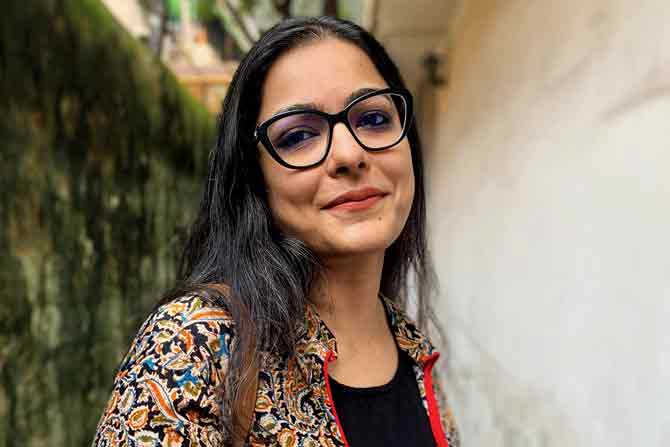
Devapriya Roy
Sankar feels that not having a physical festival, means a "difficult year for authors publishing for the first time or even for established authors who have books coming out now, when there is so much discussion and confusion around the changing trends and patterns because of COVID-19".
Ultimately, the experience of an offline festival isn't one that can be easily replicated. "A festival run at a venue is another animal, one totally in the wild. The pay-offs are emotional, the high is addictive. The constant and continuous hum, the chances of impulsive detours by speakers, the off-stage exchanges. What can replace actually being anywhere?" asks Antony.
Bengaluru Poetry Festival line-up
The online poetry festival this year will include, Amit Majmudar, Arundhathi Subramaniam, Avner Pariat, Gregory Kan with his craft video: Playtime, writing as rearrangement, Hussain Haidry, Karthika Nair, Kanishka Gupta, Kirun Kapur, K Satchidanandan with Nadakku Nadakku (Walk) in Malayalam, Prathibha Nandakumar’s curation of Varavara Rao’s poems, Swiss poet Roland Jurczok with
Gib mer din (Give me yours), Raena Shirali, Rajiv Mohabir, Rudrakshi Bhattacharjee, Marilyn Hacker, Meera Dasgupta, Subhashini Kaligotla, Tabish Khair with Quarantine Sonnets, Venus Jones and more.
Catch up on all the latest Mumbai news, crime news, current affairs, and a complete guide from food to things to do and events across Mumbai. Also download the new mid-day Android and iOS apps to get latest updates.
Mid-Day is now on Telegram. Click here to join our channel (@middayinfomedialtd) and stay updated with the latest news
 Subscribe today by clicking the link and stay updated with the latest news!" Click here!
Subscribe today by clicking the link and stay updated with the latest news!" Click here!






